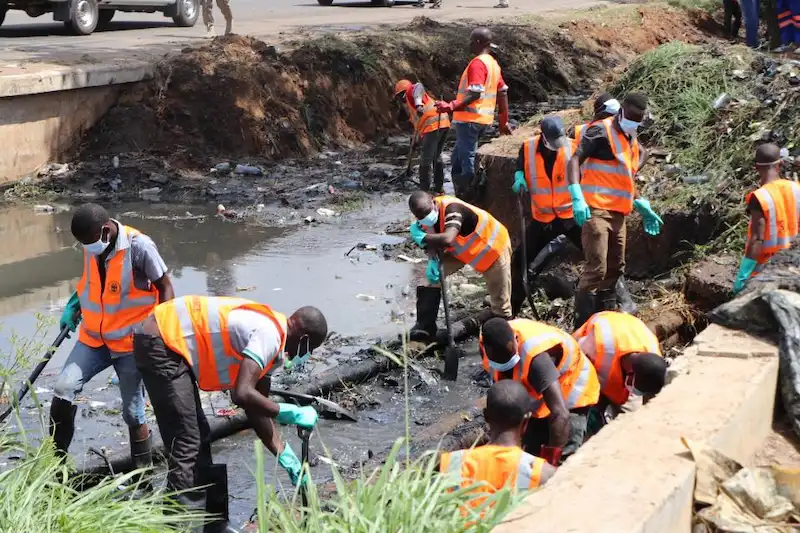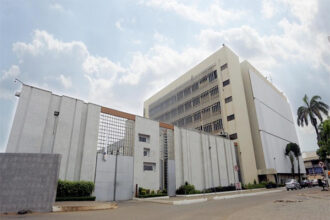If you’ve walked through the bustling streets of Accra, Kumasi, or any of Ghana’s rapidly growing cities, you’ve seen it firsthand. The piles of uncollected garbage, the plastic waste clogging open drains, and the stagnant pools of water that become breeding grounds for disease.
This isn’t just an eyesore; it’s a full-blown public health and environmental crisis, and it’s getting worse by the day. You’re not alone in noticing. The numbers tell a grim story. Across Africa, over 300 million people lack access to safe sanitation, and Ghana contributes significantly to this staggering figure.
Back in the year 2000, Ghana’s urban areas were already generating a massive 763,698 cubic meters of wastewater every single day. The real shocker? Only a tiny fraction of that is ever collected and treated. The rest flows freely, polluting water sources and endangering the health of millions.
So, how did we get here, and what can be done?
The Roots of the Problem: Why is Ghana So Dirty?
The causes are complex, but experts point to a few key culprits.
1. Our Cities Are Outpacing Our Plans
Ghana is experiencing rapid, unplanned urbanization. People are moving to cities faster than we can build the necessary infrastructure.
“The lack of adequate physical planning and social infrastructure to make up for the rapid growth in population leads to bad public sanitation habits,” explains a report on urban development. Simply put, we are producing more waste than our systems were designed to handle, leaving sanitation workers overwhelmed.
2. “Someone Else Will Handle It” – A Crisis of Awareness
For many, sanitation is someone else’s problem. There’s a widespread lack of individual and communal consciousness about the dangers of poor waste management.
This leads to low patronage of waste management services and a casual attitude towards dumping refuse in public spaces. Many people are simply unaware of the direct link between the garbage heap around the corner and their child’s case of cholera or malaria.
The Real-Life Consequences: It’s More Than Just a Bad Smell
The impact of this crisis is felt in our homes, our hospitals, and our economy.
- Disease Outbreaks: This is the most immediate danger. Stagnant water and piles of refuse are perfect breeding grounds for mosquitoes. It’s no coincidence that malaria was responsible for 19% of all recorded deaths in Ghana in 2015. According to the World Health Organization, a shocking 70% of all diseases in Ghana are directly linked to unsafe water and poor sanitation. These are preventable tragedies.
- A Blow to Tourism and the Economy: What tourist wants to visit a country plagued by filth and the health risks that come with it? Poor sanitation tarnishes Ghana’s image and discourages the tourist trade, a vital source of revenue for the nation.
The Path to a Cleaner Ghana: Is There a Way Out?
Despite the grim picture, hope is not lost. Solving this crisis requires a multi-pronged approach that involves the government, communities, and every single individual.
1. Build Smarter, Not Just Bigger
The Ghana Institute of Planners has long advocated for planned cities. This isn’t about fancy buildings; it’s about practical urban design that includes space for waste collection points, efficient drainage systems, and the infrastructure needed to manage a growing population’s waste. Knowing how much waste a community will generate allows for better planning and resource allocation.
2. Change Hearts and Minds
Awareness is everything. We need a national movement that makes sanitation a personal priority. This means community committees championing clean-ups, schools teaching children about hygiene, and public campaigns that clearly show the link between a dirty environment and disease. When people understand that a clean street means a healthier family, they are more likely to act.
3. Stronger Policies and Real Enforcement
Sometimes, persuasion isn’t enough. We need policies with teeth. This could mean holding landlords accountable for providing adequate waste disposal options for their tenants or imposing strict fines on individuals and companies that illegally dump waste.
As one environmental activist put it, “When people realize that dumping refuse in the open is more expensive than paying for waste collection, their behavior will change.”
The Bottom Line
Ghana’s sanitation problem is a deep-seated issue, but it is not insurmountable. The cost of inaction – in lives lost, healthcare expenses, and missed economic opportunities is far too high.
The solution lies in a collective effort: from government planners designing smarter cities, to community leaders mobilizing their neighbors, right down to each of us taking responsibility for our own waste.
The clean, healthy, and prosperous Ghana we all want starts with a simple choice: to no longer look away from the filth, but to roll up our sleeves and tackle it together.
What do you think is the most important step to solve Ghana’s sanitation crisis? Share your thoughts and any local initiatives you know of in the comments below.










